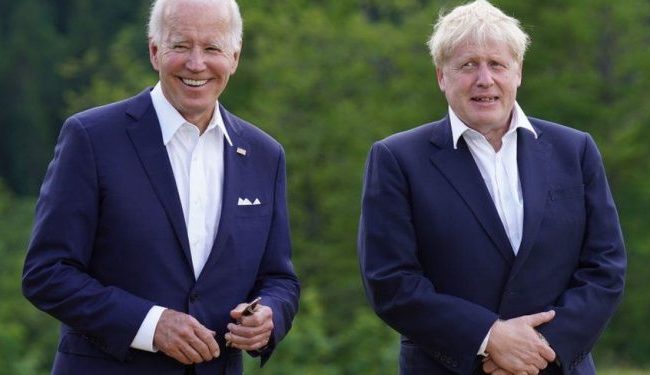G7 summit: Leaders detail $600bn plan to rival China’s Belt and Road initiative
- Posted on
- Comment

G7 leaders have detailed plans to mobilise $600bn in funding for the developing world in a move seen as a counter to China’s Belt and Road plan.
The Partnership for Global Infrastructure and Investment (PGII) relaunches a scheme unveiled at last year’s G7 talks in England.
US President Joe Biden said the plan would deliver returns for everyone.
China’s multi-trillion dollar infrastructure initiative is criticized for hitting nations with too much debt.
“I want to be clear. This isn’t aid or charity,” Mr Biden said of the G7’s PGII scheme. “It’s an investment that will deliver returns for everyone.”
The scheme would allow countries to “see the concrete benefits of partnering with democracies,” the US president added.
The plan calls on G7 leaders to raise $600bn over five years to fund the launch of infrastructure projects in middle and low-income countries.
The US has promised to raise $200bn (£162bn) of the total through grants, federal funds and private investment, while the EU has announced a further 300bn euros (£257bn).
The initiative will be geared towards tackling climate change, improving global health, achieving gender equity and building digital infrastructure.
Some of the highlighted initiatives include a solar-powered project in Angola, a vaccine manufacturing facility in Senegal, and a 1,609 km submarine telecommunications cable connecting Singapore to France via Egypt and the Horn of Africa.
The plan has been pitched as a way to counter China’s ambitious Belt and Road Initiative (BRI). Launched by Chinese president Xi Jinping in 2013, the BRI provides financing for emerging countries to build infrastructure like ports, roads and bridges.
While it has developed trade links, it has also been criticised as a means of providing “predatory loans”, forcing debt-saddled countries to cede key assets if they fail to meet their debt repayments.
European Commission President Ursula von der Leyen said the aim of the latest project was to present a “positive powerful investment impulse to the world to show our partners in the developing world that they have a choice”.
The infrastructure plan was first unveiled at the 2021 G7 summit in Britain. Called the Build Back Better World at the time, the US-driven plan faltered from a lack of progress, and the project was renamed to PGII before being resuscitated at the 2022 summit.
-BBC






 (Selorm) |
(Selorm) |  (Nana Kwesi)
(Nana Kwesi)